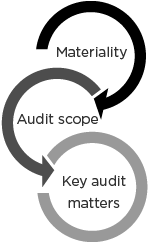Report on the audit of the consolidated financial statements
Opinion
We have audited the consolidated financial statements of Clariant Ltd and its subsidiaries (the Group), which comprise the consolidated balance sheet as at 31 December 2016 and the consolidated income statement, consolidated statement of comprehensive income, consolidated statement of changes in equity and consolidated statement of cash flows for the year then ended, and notes to the consolidated financial statements, including a summary of significant accounting policies.
In our opinion, the consolidated financial statements (pages 156 to 222) give a true and fair view of the consolidated financial position of the Group as at 31 December 2016 and its consolidated financial performance and its consolidated cash flows for the year then ended in accordance with the International Financial Reporting Standards (IFRS) and comply with Swiss law.
Basis for opinion
We conducted our audit in accordance with Swiss law, International Standards on Auditing (ISAs) and Swiss Auditing Standards. Our responsibilities under those provisions and standards are further described in the »Auditor’s responsibilities for the audit of the consolidated financial statements« section of our report.
We are independent of the Group in accordance with the provisions of Swiss law and the requirements of the Swiss audit profession, as well as the IESBA Code of Ethics for Professional Accountants, and we have fulfilled our other ethical responsibilities in accordance with these requirements. We believe that the audit evidence we have obtained is sufficient and appropriate to provide a basis for our opinion.
Overview |
Overall Group materiality: CHF 30 million |
|
We concluded full scope audit work at 18 reporting units in nine countries and we audited the accounting for the sales and procurement processes in two shared service centers for various other reporting units. Our full audit scope addressed over 66% of the Group’s revenue and 70% of the Group’s assets; 5% of the Group’s assets were addressed by specified audit procedures. In addition, we performed analytical procedures on the remaining components. As key audit matters the following areas of focus have been identified:
|
Audit scope
We designed our audit by determining materiality and assessing the risks of material misstatement in the consolidated financial statements. In particular, we considered where subjective judgments were made; for example, in respect of significant accounting estimates that involved making assumptions and considering future events that are inherently uncertain. As in all of our audits, we also addressed the risk of management override of internal controls, including among other matters consideration of whether there was evidence of bias that represented a risk of material misstatement due to fraud.
We tailored the scope of our audit in order to perform sufficient work to enable us to provide an opinion on the consolidated financial statements as a whole, taking into account the structure of the Group, the accounting processes and controls, and the industry in which the Group operates. From the 145 reporting units in 48 countries, we identified 18 reporting units (components) to be the largest contributors to the Group’s financial statements (amounting to 66% of the Group’s revenue and 70% of the Group’s assets, addressing all geographical areas of the Group’s business). These reporting units were subject to a full scope audit by local PwC network firms. Besides in-person meetings, we held regular calls during all audit phases to discuss material audit topics with the component auditors of the most significant reporting units. Another major part was audited by the central PwC team in Switzerland. 5% of the Group’s assets were addressed by specified audit procedures. In addition, two PwC network firms performed specific audit procedures related to sales and procurement and the financial closing cycle at the Company’s shared service centers on behalf of PwC Switzerland and assisting other PwC network firms.
Materiality
The scope of our audit was influenced by our application of materiality. Our audit opinion aims to provide reasonable assurance that the consolidated financial statements are free from material misstatement. Misstatements may arise due to fraud or error. They are considered material if, individually or in aggregate, they could reasonably be expected to influence the economic decisions of users taken on the basis of the consolidated financial statements.
Based on our professional judgment, we determined certain quantitative thresholds for materiality, including the overall Group materiality for the consolidated financial statements as a whole as set out in the table below. These, together with qualitative considerations, helped us to determine the scope of our audit and the nature, timing and extent of our audit procedures and to evaluate the effect of misstatements, both individually and in aggregate, on the consolidated financial statements as a whole.
Overall Group materiality |
CHF 30 million |
How we determined it |
2.5% of the Group’s EBITDA, weighted at 75%, and 1% of the Group’s total assets weighted at 25% |
Rationale for the materiality benchmark applied |
We chose EBITDA as the benchmark because the Group assesses its profitability mainly based on this measure of profit and we took the Group’s assets into consideration because the chemical industry is highly capital intensive with a lower net profit margin compared with other industries. |
We agreed with the Audit Committee that we would report to them misstatements above CHF 1.5 million identified during our audit as well as any misstatements below that amount which, in our view, warranted reporting for qualitative reasons.
Key audit matters
Key audit matters are those matters that, in our professional judgment, were of most significance in our audit of the consolidated financial statements of the current period. These matters were addressed in the context of our audit of the consolidated financial statements as a whole, and in forming our opinion thereon, and we do not provide a separate opinion on these matters.
Key audit matter |
How our audit addressed the key audit matter |
We consider impairment testing of goodwill to be a key audit matter because of the significant scope for judgment with respect to assumptions concerning the future results of the businesses and the discount rates applied to future cash flow forecasts. Specifically, we focused on goodwill relating to the Functional Minerals business unit, which amounts to CHF 143 million, and the Catalysts business unit, which amounts to CHF 628 million, as the risk of impairment is higher for these units compared with other business units. Please refer to Critical accounting estimates and judgments, 4.1 Estimated impairment of goodwill, intangibles and property, plant and equipment, and Goodwill allocation in the notes. |
We evaluated and challenged management’s assumptions as described in notes 4 and 8 of the notes to the consolidated financial statements. Management followed a clearly documented process for forecasting future cash flows, which was subject to timely oversight and challenges by the Board of Directors and which was consistent with the business plans as approved by the Board of Directors. We compared the actual results of the year under review with the figures used to make the forecasts in the prior year in order to assess with hindsight whether any of the assumptions underlying the forecasts might have been too optimistic. In some cases, actual performance was found to be lower than forecast. Management analysed the underlying drivers and considered actual revenue growth rates and operating margins against those in the business plans prepared in the year under review. We discussed with the business unit leaders management’s assumptions regarding revenue, long-term growth rates and profit margins. We involved PwC’s own valuation specialists to assess the model and the weighted average cost of capital (WACC) used. The WACC was assessed using comparable industry peers and data available from external sources. In addition, we assessed for reasonableness the expectations of movements in working capital and of investments in property, plant and equipment. We found the assumptions to be balanced and reasonable. We reperformed thorough sensitivity analyses on the key assumptions to ascertain the extent of change in those assumptions that either individually or collectively would be required for the goodwill to be impaired. We discussed the results of our audit work as well as the headroom of the sensitivity analyses with management and the Audit Committee. On the basis of the procedures performed and the evidence obtained, we identified no significant issues with respect to the assumptions used in the impairment test for goodwill. |
Key audit matter |
How our audit addressed the key audit matter |
There is a risk that revenue is not recognized in accordance with the requirements of IFRS, mainly with regard to the timing of revenue recognition, which depends on the transfer of risks and rewards. We consider this to be a key audit matter because a number of large transactions occur close to yearend. |
We identified transactions occurring close to the balance sheet date of 31 December 2016 and checked the appropriate timing of revenue recognition by examining the third party documentation and the contractual delivery terms. On the basis of the procedures performed and the evidence obtained, we identified no significant issues with respect to revenue cut-off. |
Key audit matter |
How our audit addressed the key audit matter |
We consider current income tax payables to be a key audit matter as income tax audits are being carried out currently (particularly in Germany) and the outcome of these audits is uncertain. The Group has estimated the amounts that may be due and made provisions for these estimated amounts. Please refer to Critical accounting estimates and judgments, 4.3, Income tax and other taxes. |
We involved PwC’s own tax specialists to assess the current status of these investigations and to assess the reasonableness of the amounts provided for. We discussed the outcome with management and the Audit Committee. On the basis of procedures performed and the evidence obtained, we identified no significant issues with respect to the Group’s assessments of current income tax payables. |
Other information in the annual report (integrated report)
The Board of Directors is responsible for the other information in the annual report (integrated report). The other information comprises all information included in the annual report (integrated report), but does not include the consolidated financial statements, the standalone financial statements and the remuneration report of Clariant Ltd and our auditor’s reports thereon.
Our opinion on the consolidated financial statements does not cover the other information in the annual report (integrated report) and we do not express any form of assurance conclusion thereon.
In connection with our audit of the consolidated financial statements, our responsibility is to read the other information in the annual report (integrated report) and, in doing so, consider whether the other information is materially inconsistent with the consolidated financial statements or our knowledge obtained in the audit, or otherwise appears to be materially misstated. If, based on the work we have performed, we conclude that there is a material misstatement of this other information, we are required to report that fact. We have nothing to report in this regard.
Responsibilities of the Board of Directors for the consolidated financial statements
The Board of Directors is responsible for the preparation of the consolidated financial statements that give a true and fair view in accordance with IFRS and the provisions of Swiss law, and for such internal control as the Board of Directors determines is necessary to enable the preparation of consolidated financial statements that are free from material misstatement, whether due to fraud or error.
In preparing the consolidated financial statements, the Board of Directors is responsible for assessing the Group’s ability to continue as a going concern, disclosing, as applicable, matters related to going concern and using the going concern basis of accounting unless the Board of Directors intends either to liquidate the Group or to cease operations, or has no realistic alternative but to do so.
Auditor’s responsibilities for the audit of the consolidated financial statements
Our objectives are to obtain reasonable assurance about whether the consolidated financial statements as a whole are free from material misstatement, whether due to fraud or error, and to issue an auditor’s report that includes our opinion. Reasonable assurance is a high level of assurance, but is not a guarantee that an audit conducted in accordance with Swiss law, ISAs and Swiss Auditing Standards will always detect a material misstatement when it exists. Misstatements can arise from fraud or error and are considered material if, individually or in the aggregate, they could reasonably be expected to influence the economic decisions of users taken on the basis of these consolidated financial statements.
As part of an audit in accordance with Swiss law, ISAs and Swiss Auditing Standards, we exercise professional judgment and maintain professional scepticism throughout the audit. We also:
- Identify and assess the risks of material misstatement of the consolidated financial statements, whether due to fraud or error, design and perform audit procedures responsive to those risks, and obtain audit evidence that is sufficient and appropriate to provide a basis for our opinion. The risk of not detecting a material misstatement resulting from fraud is higher than for one resulting from error, as fraud may involve collusion, forgery, intentional omissions, misrepresentations, or the override of internal control.
- Obtain an understanding of internal control relevant to the audit in order to design audit procedures that are appropriate in the circumstances, but not for the purpose of expressing an opinion on the effectiveness of the Group’s internal control.
- Evaluate the appropriateness of accounting policies used and the reasonableness of accounting estimates and related disclosures made.
- Conclude on the appropriateness of the Board of Directors’ use of the going concern basis of accounting and, based on the audit evidence obtained, whether a material uncertainty exists related to events or conditions that may cast significant doubt on the Group’s ability to continue as a going concern. If we conclude that a material uncertainty exists, we are required to draw attention in our auditor’s report to the related disclosures in the consolidated financial statements or, if such disclosures are inadequate, to modify our opinion. Our conclusions are based on the audit evidence obtained up to the date of our auditor’s report. However, future events or conditions may cause the Group to cease to continue as a going concern.
- Evaluate the overall presentation, structure and content of the consolidated financial statements, including the disclosures, and whether the consolidated financial statements represent the underlying transactions and events in a manner that achieves fair presentation.
- Obtain sufficient appropriate audit evidence regarding the financial information of the entities or business activities within the Group to express an opinion on the consolidated financial statements. We are responsible for the direction, supervision and performance of the Group audit. We remain solely responsible for our audit opinion.
We communicate with the Board of Directors or its relevant committee regarding, among other matters, the planned scope and timing of the audit and significant audit findings, including any significant deficiencies in internal control that we identify during our audit.
We also provide the Board of Directors or its relevant committee with a statement that we have complied with relevant ethical requirements regarding independence, and communicate to them all relationships and other matters that may reasonably be thought to bear on our independence, and where applicable, related safeguards.
From the matters communicated with the Board of Directors or its relevant committee, we determine those matters that were of most significance in the audit of the consolidated financial statements of the current period and are therefore the key audit matters. We describe these matters in our auditor’s report unless law or regulation precludes public disclosure about the matter or when, in extremely rare circumstances, we determine that a matter should not be communicated in our report because the adverse consequences of doing so would reasonably be expected to outweigh the public interest benefits of such communication.
Report on other legal and regulatory requirements
In accordance with article 728a paragraph 1 item 3 CO and Swiss Auditing Standard 890, we confirm that an internal control system exists which has been designed for the preparation of consolidated financial statements according to the instructions of the Board of Directors.
We recommend that the consolidated financial statements submitted to you be approved.
PricewaterhouseCoopers AG

Rolf Johner
Audit expert
Auditor in charge

Ruth Sigel
Audit expert
Basel, 14 February 2017
PricewaterhouseCoopers AG
St. Jakobs-Strasse 25, Postfach, CH-4002 Basel, Switzerland
Telephone: + 41 58 792 51 00, Facsimile: + 41 58 792 51 10, www.pwc.ch
PricewaterhouseCoopers AG is a member of the global PricewaterhouseCoopers network of firms, each of which is a separate and independent legal entity.
The International Financial Reporting Standards (IFRS) are international accounting standards. VIEW ENTIRE GLOSSARY

